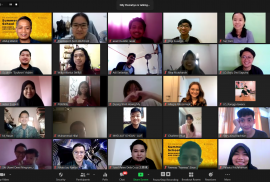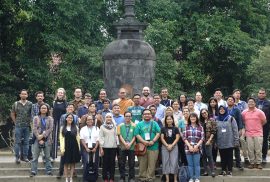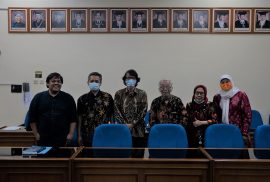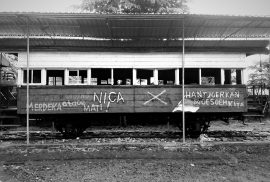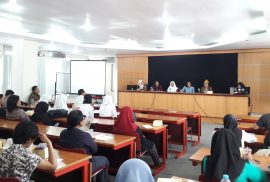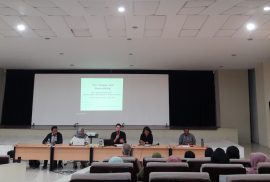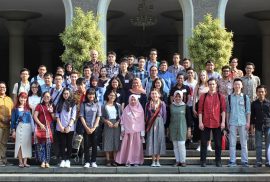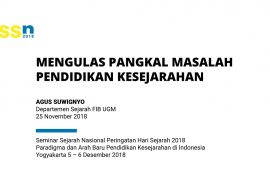Setelah hampir satu tahun mengalami pandemi, metode pembelajaran virtual seharusnya tak lagi menghalangi. Hal ini dibuktikan oleh Departemen Sejarah UGM yang sukses mengadakan virtual summer school bertajuk “The 3rd International Summer School- Resilience and Control: Transmissible Disease and the Rise of Modern Society.” Virtual Summer School pertama yang diadakan oleh Fakultas Ilmu Budaya UGM sejak pandemi ini berlangsung pada 2-22 Agustus 2021. Acara ini dibuka oleh Kepala Kantor Urusan Internasional UGM, I Made Andi Arsana, S.T., M.Sc, Ph.D yang kemudian dilanjutkan oleh sambutan pembuka dari perwakilan universitas rekanan, Prof. Dr. Kate McGregor dari Melbourne University Australia, dan Kepala Departemen Sejarah FIB UGM, Dr. Abdul Wahid.
__________
Course Title
Resilience and Control: Transmissible Disease and the Rise of Modern Society
__________
Course Description The Covid19 epidemic has reminded all of us of how fragile the relationship between man and nature has always been. Modern society to a significant extent was based on the mythology of the control of nature by man-made science and the reduction of risk of the dangers lurking outside of human civilization. The latest Anthropocene-approach to understanding human and the natural world tend to emphasize human effect on nature. Human civilization became the determiner of a fragile and weak natural system ravaged by the activities of global man. While the discussion on Risk Society also focused on the dangers of civilizations and the running way of technology to the detriment of human society and civilization. The fear always comes from the dangers lurking from within human civilization. This idea of the scientific conquest of the natural world was a central myth of modern society. Yet, just a century ago, the idea of the natural order controlling human fate and civilization had reigned supreme. Capitalism and industrialization had by then expanded to towering heights, producing hellish landscapes of the Satanic mills or the tragedy of the bondage laborers of tropical plantations. Yet these landscapes were rarely seen as taking over nature. The industrialization of the 19th century and the greater human civilization was still seen to be eking its existence on the margins of the natural world. Yet, it was also at this same period in which this gradually changed. In particular, the various technologies that appeared to eradicate transmissible disease and control the pathogenic dangers of nature were afoot. Hygiene and medical biology began to be developed based on the novel idea of the germ theory, the idea that much of the disease that has inflicted humankind was the result of tiny creatures invisible to the naked eye. This hygienic triumph changed so much of how we live, act and think that it is very much probable that the modern world that we know can only be understood to result from the absolute and unassailable control of modern hygiene and modern science. The Covid19 pandemic also alerted us of this towering control of science over the human freedom that we’ve conveniently forgotten. Like Plato’s cavemen, the ropes of scientific controls over our lives and civilizations were suddenly revealed as it was constructed in order to stave us off from the forgotten dangers of pathogens. Instead, we relive our premodern fears of nature and understood once again the fragility of human civilization and the hubris which has made us forgotten the bondage that it created. The exploration between modern society and transmissible disease in this years’ Summer School on Transnational History is not to reinvigorate the old trope of man versus nature, but in fact to understand the entanglements between the biological and the human world. The myth of modern society was exactly rooted, as noted above, in the illusion of carving the natural and the human world as separate spaces. Instead, we look at how transmissible diseases, like all global biological processes, has a way to make us rethink and understand the role of pre-modern human societies, the society before hygienic science and its management retooled society since the early 20th century. Alison Bashford has conducted studies on how various diseases determined different regimes of control based on the current notions of race, gender, and other identities. She saw how ideas of white male masculinities were tied to Australia’s effort to maintain a white society in the tropics. Warwick Anderson on the other hand saw how racial ideas of segregation and differences were applied to the colonial control by Americans in the Philippines. The disease was thus manifestations of behaviors and racial characteristics of the Filipinos. Covid19 alerts us of these synthetic and often nefarious regimes of controls which, on the surface, were thrust to society in the language of science and public policy, but which has always been rooted in the manifestation of the racial, gender, religious and other prejudices. These forms of control were also important in creating the new modern subjects – to be behaviorally controlled into one kind of modern man. He or she would eat in a certain way, move in a certain way and think in a certain way. Thus, the question of scientific conquest of nature seemed less about the natural world than it was about humans. It can also be seen as a scientific conquest of humans and humanity. Yet, there is also another facet to this story. The creation of technology and control of transmissible disease could also provide an empowering opportunity to various societies. The control of disease opened the chance to expand the population, local societies could reclaim and change the behavioral controls of science, and identities always thrived despite the various forms of spatial and behavioral control. Human ingenuity and resilience were not just a lucky component, it was an inherently important one for the success of modern society. It was exactly in human resilience, in its ability to adapt and strategize new ways of living with this control that allowed for the modern hygienic control to succeed. Human efforts to subvert regimes of control represented the continuation of human freedom and the human spirit in the advent of such transcendentally global mechanisms of control. The various technologies of control from public health and hygiene, town planning and architecture, transportation technologies and management of travel, engineering and food science, ideas of morality, identity and new subjectivities and others – reflecting on racial, gender, nationhood and others, represented both the dangers and promises of this new modern society. The similarities of these technologies and how they spread through transnational forms represented the ways in which modern society became increasingly entangled. The exploration of the rise of this society, the entanglement of the local and global within the context of both scientific regimes of control and its interconnection with imperialism, racism, and other non-scientific norms of order, the resilience of various societies in subverting these controls and the empowering effects of these transnational forces represented the core of a human-biological perspective in understanding the rise of the modern world. This is what will be explored in the Summer School of 2021. It is an homage to that scientific world of control that had seemingly died in 2020, but which will continue to live on. Disruption like the Covid19 allows us to rethink the relationship between behaviors, space, and identity in the modern world – who and why are some winners and others lookers in these new strategies of control. It also allows us to see histories in the region and the wider world as transnational and entangled exactly because of the interaction between local societies, global capitalism, and the wider natural world. It is important to understand that this world never ended, these interactions between the global, local, and natural remain the most important relationship of human society. In this regard, we will ponder upon how to deal with these divergent questions in a transnational and entangled way. We will ponder together and share ideas from our own localities in order to see this history as local, national, and transnational processes.
“Peran penting film dokumenter pada masa pendudukan Jepang di Indonesia” menjadi topik bahasan utama dalam webinar yang diselenggarakan oleh Departemen Sejarah FIB UGM pada Rabu, 31 Maret 2021. Dalam diskusi webinar yang bertajuk “Di Bawah Terang ‘Cahaya Asia’: Film Dokumenter di Masa Pendudukan Jepang di Indonesia 1942-1945” ini sukses dihadiri oleh peserta dari berbagai kalangan dan institusi. Dalam diskusi webinar ini hadir Dr. Budi Irawanto sebagai pembicara dan Dr. Abdul Wahid sebagai pembahas. Kemudian untuk mengatur jalannya diskusi yang berlangsung selama 1 jam 30 menit mulai pukul 15.00 hingga pukul 16.30 ini maka turut hadir Julianto Ibrahim, M. Hum selaku moderator webinar.
Pada 23 Maret 2021, Departemen Sejarah, Fakultas Ilmu Budaya, Universitas Gadjah Mada baru saja mengadakan acara peluncuran buku persembahan bagi Prof. Dr. Djoko Suryo dan Dr. J. Thomas Lindblad. Acara peluncuran buku yang berjudul, “Eksploitasi, Modernisasi, dan Pembangunan: Perubahan Sosial Ekonomi Pedesaan Jawa pada Kolonial dan Post-Kolonial” ini dilaksanakan melalui daring dan juga luring dengan mengambil tempat di ruang sidang pimpinan. Pada acara peluncuran buku ini, Prof. Dr. Djoko Suryo yang ditemani oleh istri turut hadir di ruang sidang pimpinan bersama dengan para dosen Departemen Sejarah FIB UGM yang diwakili oleh Dr. Abdul Wahid, M. Hum, M. Phil., Dr. Farabi Fakih, M. Phil., Dr. Sri Margana, M. Phil., dan Dr. Mutiah Amini, M. Hum. Kemudian disela-sela acara peluncuran buku ini juga dilakukan kegiatan sharing dan temu kangen antar dosen lain yang selama masa pandemi sulit untuk melakukan pertemuan tatap muka. (Adit)
About the Scholarship
In order to encourage the continuation of the tradition of historical study about Independence Revolution, Department of History developed a special program in the form of research scholarships for master and doctoral students. This program is aimed to research, write scientific publication, or final assignments about the period of the Indonesian Revolution in the years 1945-1949. this research scholarship scheme is the part of cooperation collaborative research program between Department of History UGM and KITLV Leiden “Proklamasi Kemerdekaan, Revolusi, dan perang di Indonesia, 1945-1949”. this scholarship program will be held at odd semester of academic year 2020/2021 and 2021/2022/
Research Theme
The big theme of this research scholarship program is “Indonesia Revolution 1945-1949 in regional and global context”. the theme included, but not limited, to this aspects: social, culture, art, ethnicity, economy, religion, diplomation, politic, government, logistic, transportation, technology, military, gender, family, minority, education, etc.
Terms and Conditions
The first opportunity as a speaker was given to Mrs. Djuwariyah who shared her experience about the revolutionary period. As a witness to the history of the revolution that was born in 1933, when she was 15 years old, in 1948 to be precise, she became a member of the Red Cross who also served as a courier for the revolutionary soldiers in Yogyakarta. Now, at the age of 86 years, she is still able to tell in detail and coherently about the conditions she experienced during the revolution since the beginning she was involved in the struggle until the end of the struggle to defend the independence of the Republic of Indonesia. In addition, she was also involved in the Red Cross which served during the DI-TII period in Bumiayu. For Mrs. Dju, her nickname, the struggle during DI-TII was more difficult because the ‘enemies’ they faced were difficult to distinguish from other Indonesians. If Djuwariyah represented the early generation of the Indonesian revolutionary struggle, Galuh Ambar Sasi spoke as the second generation as an independent historical researcher. This alumni of the UGM History Masters program has an interest in women’s reactions to the proclamation and their role during the revolution. The third generation invited was Shinta Dwi Nugraeni, a student of Senior High School 2 Bantul. Shinta, who previously won first place in the 2019 National History Tour essay competition, shared her experience while studying history at school. For Shinta, the position of women during the revolutionary period was not significantly described, neither in textbooks nor in LKS books used in schools. No wonder, Shinta comments, that history is one of the most boring subjects for other students.
After the three speakers shared their experiences, Dr. Mutiah Amini, who was appointed as a keynote speaker who also has an interest in women’s history, gave responses and comments to the three speakers, especially about Djuwariyah’s experience during the revolution which will enrich the historical treasures of the revolution from a women’s perspective. Apart from that, she also spoke on a more general topic, namely the importance of women’s perspectives in history. For her, there are many historical periods that look minimal in archives but can actually be studied further. The use of symbolic sources when analyzed further will produce a very rich historical narrative.
By presenting speakers across generations, this discussion successfully taught how to interpret the role of women during the revolutionary period. [sej/habibi]
The workshop was filled by 10 speakers who were divided into three sessions. The first session began with a presentation on ethnomusicology from Dr. Barbara Titus. As the person who now occupies the position of the late Jaap Kunst as head of Ethnomusicology at the Universiteit van Amsterdam, he not only explains about Jaap Kunst’s legacy, but also criticizes and describes opportunities for ethnomusicology studies in the future. One panel with Barbara is Dr. Citra Aryandari and three of her students from ISI Yogyakarta. They shared the reasons for their interest in studying ethnomusicology.
The second session was filled by three people, namely RM Surtihadi, M.Sn., Indra Fibiona, S.S., and Dr. Sri Margana. Surtihadi who is also a doctoral student at ISI Yogyakarta explained about the mixing of Javanese and European music at the Yogyakarta Palace, while Indra Fibiona from the Yogyakarta Cultural Value Conservation Center (BPNB) explained the biography of R.M. Djajadipoera who during his lifetime often interacted with Jaap Kunst when he visited Yogyakarta. Djajadipoera is one of the music and dance figures at the Yogyakarta Palace. Sri Margana’s presentation from the UGM History Department focused more on his research on the archives of Djajadipoera’s correspondence with Jaap Kunst. Apart from directly watching music performances, Jaap Kunst also studied music through correspondence with many music experts and the two figures he wrote to the most were Mangkunegoro VII and Djajadipoera.
Furthermore, the third session was filled by Margi Ariyanti and Henk Mak van Dijk. Margi Ariyanti is a graduate student in the Study of Performing Arts and Fine Arts/ Pengkajian Seni Pertunjukan dan Seni Rupa (PSPSR) UGM, while Henk Mak van Dijk from the Music Conservatory of Rotterdam & the Royal Conservatory in The Hague. On that occasion, Margi tried to make a comparison between the famous Indo composer, Constant van de Wall, and Ki Hadjar Dewantara. Meanwhile, Henk who also teaches at the Muziek Academie, The Hague, spoke further about the career of one of the most successful composers. In 2007, he also published a biography of van de Wall. In addition to de Wall, Henk also mentions several composers who are similar to de Wall in mixing elements of Javanese music into European music, including a female composer born in Yogyakarta, Linda Bandara.
The ten speakers above did not only talk about Jaap Kunst individually, but also about ethnomusicology more broadly. This is in line with the event’s goal of developing, not just unlocking, the legacy of Jaap Kunst. In addition to the explanation of the knowledge requirements, the workshop participants were even more interested because the event was closed by Henk’s piano playing who performed compositions by Paul Seeling, van de Wall, and Linda Bandara. [sej/habibi]
Course Description
The Department of History, Universitas Gadjah Mada in Yogyakarta plan to continue holding its second year summer school on transnationalism in Southeast Asia following on the successful summer school on transnationalism held at the Faculty of Cultural Sciences, Universitas Gadjah Mada in 2018 with the title “Transnational History: Becoming a Cosmopolitan Historian.” The theme of the second summer school is a broadening of the application of transnationalism in looking not just at historical phenomenon, but present day economic, social, religious, cultural and political phenomenon in the city of Yogyakarta that is rooted in transnational forces and flows. By looking at how transnational flows create emergent potentialities that disrupt regulatory, moral and cultural spaces tethered on notions of fixed spaces and boundaries, the disruptive forces of transnationalism have resulted in categorizing certain people, things, practices and ideas as illegal, illicit, immoral and other pejorative notions; for instances illegal immigrants, drugs or ‘western-customs’. At the same time, other people, things, practices and ideas are considered as legal, legitimate and good. The movement of these groups from one society or country to another has resulted in placing these groups on either side of the legal, licit and moral framework resulting in contestations and reformulation of the framework themselves. These interplay between legal and illegal and moral and immoral thus represent a way in which societies ‘move forward’, by contesting the boundaries and framework of what are considered as good, bad or neutral.
We intend to look into these phenomena critically through theoretical, historical and social science discussion on various transnational manifestations in the city of Yogyakarta. These transnational phenomena appear in the form of social spaces, cultural events, economies and belief systems and represent the intertwining of transnational and local spaces and societies. These represented long historical phenomena from the period when Southeast Asia was part of that Asian trade network that brought over foreign culture, religion and social practices that would be entwined in the city’s identities. These same historical forces continue today and become engaged or re-engaged with present day flows; for instance, the rise of modern religion whether Islam, Christianity or Buddhism resulting in new flows such as pilgrimages to ‘new’ holy sites of the old Borobudur, or how ideas of the mysterious and transcendental East has created a tourist networks of ‘hippies’ on the hunt for spiritual enlightenment, or new practices that were brought over from Indonesian migrant workers and their discrimination at the hands of officials or the rise of Kpop or JPop and its relations with the racial notions of identities of Asian cool or new re-engagement with old forms of sexualities, religious beliefs and how these are met in today’s democratic Indonesia. These and others represent the field study in which students could engage, theorize and historicize such phenomenon in order to understand and appreciate them. These changes are often disruptive and result in dismay, discrimination, banning and, perhaps even, persecution. Understanding how some of these flows came to be regarded as normal while others persecuted is an important component of the critical education of the summer school.
__________
Learning Outcome
- To emphasize understanding about history and transnationalism in Southeast Asia
- To discuss contemporary issues related to transnationalism in Southeast Asia in culture, gender sexuality, economy and religion context.
- To emphasize understanding about transnationalism process network in Southeast Asia.
__________
Method and Output
The aim of the summer school is to provide the means for students in the field of history and social sciences to critically engage with transnational phenomenon by analyzing its manifestation in the city of Yogyakarta. By holding this exercise as a multicultural and multinational venture with students from around the Southeast Asia region and beyond, it allows students to distance themselves from their national narratives and regulatory, moral and cultural spaces. This distance allows them to open dialogue and re-examine their territorialized notions of legal and moral perspectives. The summer school is a cosmopolitan and denationalizing exercise; gathering students from around the world in order to facilitate a transnational dialogue. The dangers of placing people, things, practices and ideas within these legal and moral framework is apparent when one confronts its human victim; whether they be victims of state apparatus or criminals profiting from these transnational flows. At the same time, the creation of transnational spaces results in emergent identities, practices and ideas that are positive, uplifting and creative. This positive aspect of transnationalism also requires a critical perspective in understanding its relationship with the wider society and with the wider transnational flows. Students will be equipped with theoretical lectures on transnationalism and transnational history, but also engage in field studies into communities, organizations or activities in the city of Yogyakarta. The transnational approach allows such a local and semi-isolated place like Yogyakarta to be a rich node of global processes because its framework inherently decenter nodal connections. It also allows us to see in what way has Europe, Australia, Thailand, Vietnam, Malaysia, the Philippines and so forth are reflected in the history and phenomenon of Yogyakarta. such exercise will allow students to identity transnational connections with their own local histories, identities and practices.
__________
Time & Place
Date : July 22nd – August 2nd, 2019
Time : 08.30 am-15.00 pm
Course Venue : Faculty of Cultural Sciences, Universitas Gadjah Mada
Field Research : Communities in Yogyakarta
__________
Lecturer
- Prof. Dr. Atsushi Ota (Keio University, Japan)
- Prof. Dr. Bambang Purwanto (Faculty of Cultural Sciences, Universitas Gadjah Mada, Indonesia)
- Prof. Dr. Danny Wong Tze Ken (University of Malaya, Malaysia)
- Prof. Dr. Itty Abraham (National University of Singapore, Singapore)
- Prof. Dr. Jos Gommans (Leiden University, Netherlands)
- Prof. Dr. Kathrine McGregor (Melbourne University, Australia)
- Asst. Prof. Dr. Adisorn Muakpimai (Thammasat University, Thailand)
- Asst. Prof. Dr. Bhawan Ruangsilp (Chulalongkorn University, Thailand)
- Dr. Ariel C. Lopez (University of Philippine, Philippine)
- Dr. Erwan Agus Purwanto (Faculty of Social and Political Sciences, UGM)
- Dr. Farabi Fakih, M.Phil. (Faculty of Cultural Sciences, Universitas Gadjah Mada, Indonesia)
- Dr. Francis A. Gealogo (Ateneo de Manila University, Philippine)
- Dr. Laksmi A. Savitri, M.Si. (Faculty of Cultural Sciences, Universitas Gadjah Mada, Indonesia) –in confirmation-
- Dr. Pham Van Thuy (Vietnam National University, Vietnam)
- Dr. Phil. Shiskha Prabawaningtyas (Paramadina University, Indonesia)
- Dr. Sri Margana, M.Phil. (Faculty of Cultural Sciences, Universitas Gadjah Mada, Indonesia)
- Dr. Suzie Handajani, M.A. (Faculty of Cultural Sciences, Universitas Gadjah Mada, Indonesia)
- Dr. Yerry Wirawan (Sanata Dharma University, Indonesia)
- Dr. Yoseph Djakababa (Pelita Harapan University, Indonesia)
- Alia Swastika (ARK Galerie)
- Yulianti, PhD. Candidate (Faculty of Cultural Sciences, Universitas Gadjah Mada/ Leiden University)
__________
Application
The course is free but limited to 36 participants only and please read carefully important information below:
Education in Indonesia has always made the curriculum a benchmark for the success or failure of the teaching system. In fact, the curriculum is just an inanimate object, so curriculum changes are not a solution in solving educational problems. The capacity and ability of teachers is something that must be updated every second. If the teacher does not have the novelty of knowledge in accordance with the demands of the times, then education will not experience development. This is the answer, why history education has not developed much even though historical writing and research after the New Order has developed rapidly. This can be a material for self-examination as a teacher or lecturer, how new are the materials being taught in class?
Another problem is the psychology of teachers in providing motivation, both to themselves and to students. Currently, the field of history is not made a priority among young people. To be able to motivate young people to love history, teachers must first love their profession, “Teachers who happen to be teachers will not become real teachers”. So to be able to respond to technological and information developments, methodological, historiographical and teacher capacity issues must be resolved in parallel.
More can be seen in the following video:

